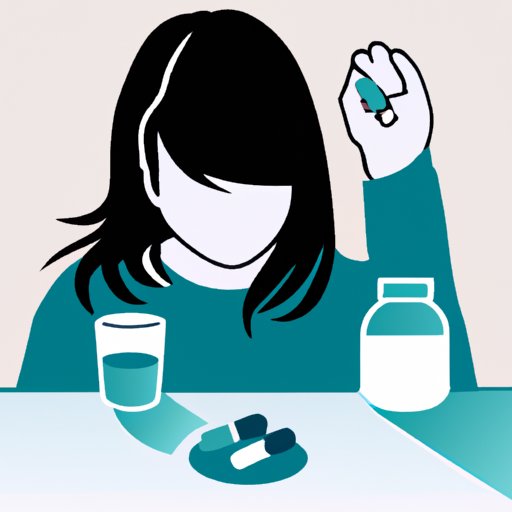
I. Introduction
Depression is a complex mental health disorder that can affect several aspects of one’s life. Among the most common symptoms of depression is fatigue, which is often described as feeling constantly tired or lacking energy and motivation to complete daily tasks. This article will explore why depression can make you tired, including its psychological and biological basis, and offer practical tips for managing chronic fatigue brought on by depression.
II. The Biological Basis of Depression-Induced Fatigue
Neurotransmitters such as serotonin, norepinephrine, and dopamine play important roles in regulating mood, motivation, and energy levels in the body. In individuals with depression, there is often an imbalance in these neurotransmitters, which can lead to fatigue. Scientific studies have found that a decreased level of serotonin, a neurotransmitter that regulates sleep-wake cycles, can lead to chronic fatigue.
III. Depression-Related Exhaustion
Besides biological factors, depression can also lead to exhaustion due to psychological factors such as stress, anxiety, and negative thinking. Studies have shown that psychological distress can negatively affect physical health, leading to conditions such as chronic fatigue syndrome.
IV. Self-Care Strategies for Managing Chronic Fatigue Brought On By Depression
Fortunately, there are several self-care techniques that you can use to combat fatigue and improve energy levels. Engaging in regular exercise and a healthy diet can go a long way in boosting energy levels. Additionally, implementing relaxation techniques such as deep breathing, meditation, and yoga can help reduce stress and improve overall mood.
V. The Vicious Cycle Of Sleeplessness and Depression
Depression-related fatigue can also cause sleeplessness, leading to a vicious cycle of depression and fatigue. Poor sleep quality can also negatively affect one’s mental health and energy levels. Establishing a pre-sleep routine and practicing good sleep hygiene can help you achieve a restful night’s sleep and break the cycle of sleeplessness and depression.
VI. The Hidden Costs of Depression-Related Lethargy
Depression-related fatigue can negatively affect several aspects of life, including work, personal relationships, and overall quality of life. Daily activities such as cooking, cleaning, and even socializing can become overwhelming. Seeking treatment and trying out self-care strategies and other methods to manage fatigue can help you regain control over your life and improve overall well-being.
VII. The Role of Medication in Alleviating Fatigue Caused By Depression
Medication such as antidepressants can help alleviate fatigue caused by depression by regulating neurotransmitters. While medication can bring relief, it’s important to remember that there are potential benefits and risks associated with it. It’s essential to consult your doctor before making any decisions about medication for managing depression-related fatigue.
VIII. When Fatigue Isn’t Just a Symptom
For individuals with treatment-resistant depression, medication may not be the best option to alleviate fatigue. In such cases, alternative methods such as psychotherapy and lifestyle changes can be used to manage depression-related fatigue. However, it’s essential to work with a mental health professional to develop a personalized approach to managing depression-related fatigue.
IX. Conclusion
Depression-related fatigue is a common symptom of depression that can negatively affect your life. By understanding the biological and psychological basis of depression-induced tiredness, you can take proactive steps to manage your fatigue. This includes engaging in self-care strategies such as exercise, meditation, and good sleep hygiene, working with a mental health professional, and considering medication if necessary. Remember, managing depression-related fatigue is achievable, and with time, you can improve your energy levels and overall well-being.




